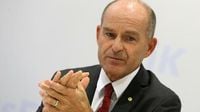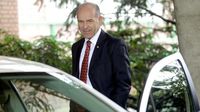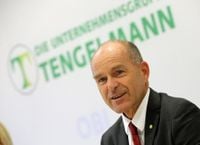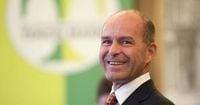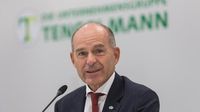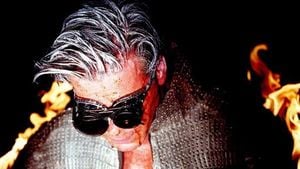The case of Karl-Erivan Haub, former CEO of the Tengelmann Group, has taken a dramatic turn nearly seven years after his mysterious disappearance in the Swiss Alps. Once viewed as a closed chapter, the narrative surrounding his fate has reignited in light of newly surfaced photographs that seemingly depict him alive in Moscow.
On April 7, 2018, Haub, known for his influential role in the Tengelmann Group's extensive business empire, was caught on surveillance camera in the ski area near the Klein Matterhorn. Following his disappearance, one of the largest search efforts in Swiss history commenced, but despite exhaustive efforts, no trace of him was found. Three years later, in June 2021, a Cologne court officially declared Haub dead. This declaration, however, came amid rising tensions within his family over the vast inheritance tied to his substantial business holdings.
Recent revelations have cast a new light on the circumstances of Haub's disappearance. The Manager Magazin published images that, according to experts, could show Haub alive in Russia. Taken by surveillance cameras on February 19 and 20, 2021, the photographs feature a man in a blue winter jacket and woolen cap, strikingly similar to the missing billionaire. Initial analyses suggest that there is a staggering 99 percent probability that the individual in the photos is indeed Karl-Erivan Haub, while a second expert estimates an 85 percent match.
The appearance of these photographs has sparked fresh speculation. Karl-Erivan's family had long since expressed their belief that he was unlikely to be found alive, a sentiment they communicated publicly in April 2021. Yet, in the wake of this latest evidence, questions abound: Did he fake his death in order to escape to Russia, or could there be another explanation for his abrupt disappearance?
Christian Haub, Karl-Erivan’s younger brother and the current CEO of the Tengelmann Group, is entangled in this web of uncertainty. At the time of his brother’s death declaration, Christian had stated under oath that he possessed “no reliable evidence, let alone proof” indicating that Karl-Erivan was still alive. However, reports now indicate that he knew about the existence of these Moscow photographs well before making that statement.
This contradiction has not gone unnoticed by authorities. The Cologne public prosecutor's office has opened an investigation into possible false testimony by Christian. The investigation came as a result of journalist Liv von Boetticher's persistent inquiries and research into the Haub case, particularly her discovery of evidence potentially linking Christian to the concealment of information regarding his brother's fate.
Although Christian now acknowledges that he was aware of the photographs, he and his legal team insist that the images are either manipulated or depict someone else entirely. This denial raises more questions than it answers. Why would he deny the existence of evidence that could potentially alter the course of the family's inheritance dispute? The implication is troubling, given that Karl-Erivan's disappearance allowed Christian and other family members to negotiate a deal that included a payment of 1.7 billion euros to cover the lost shares and stake in the family business.
The Tengelmann Group, which boasts a workforce of 60,000 and annual revenues around 8.5 billion euros, is now at the center of a complex and potentially explosive family saga. It has been revealed that Karl-Erivan maintained numerous business connections to Russia over the years and had aspirations to launch new ventures there. Speculation even surrounds his relationship with potential Russian oligarchs, hinting at layers of intrigue and risk that still need to be unpacked.
In the summer of 2024, authorities executed searches at the homes of Christian and the Tengelmann security chief to recover information related to the photos, signaling the seriousness of the investigation into Karl-Erivan Haub’s disappearance. As new evidence surfaces and public interest piques, the case resembles a Hollywood thriller more than a corporate family affair.
As questions surrounding management of the Tengelmann Group and the Haub family legacy gain traction, the determining factors surrounding Karl-Erivan Haub's fate remain elusive. Speculation regarding his possible lifespan in Russia has come to the forefront, along with the shocking prospect that he may have staged his own disappearance, potentially with the aid of those closest to him.
With the Cologne public prosecutor's office asserting they currently see “no reason” to revise the death declaration, it remains to be seen how long Christian Haub can maintain his stance. The ramifications of this case may extend far beyond the borders of family ties, reverberating through the corporate world of Tengelmann as they grapple with the fallout of their CEO’s controversial legacy.
As the investigation continues, questions linger about the truths behind the photographs and the specter of Karl-Erivan Haub in Moscow. The world watches closely, anxious to uncover whether this narrative will weave a tale of redemption or deceit, ultimately determined by the next steps in this unfolding mystery.
